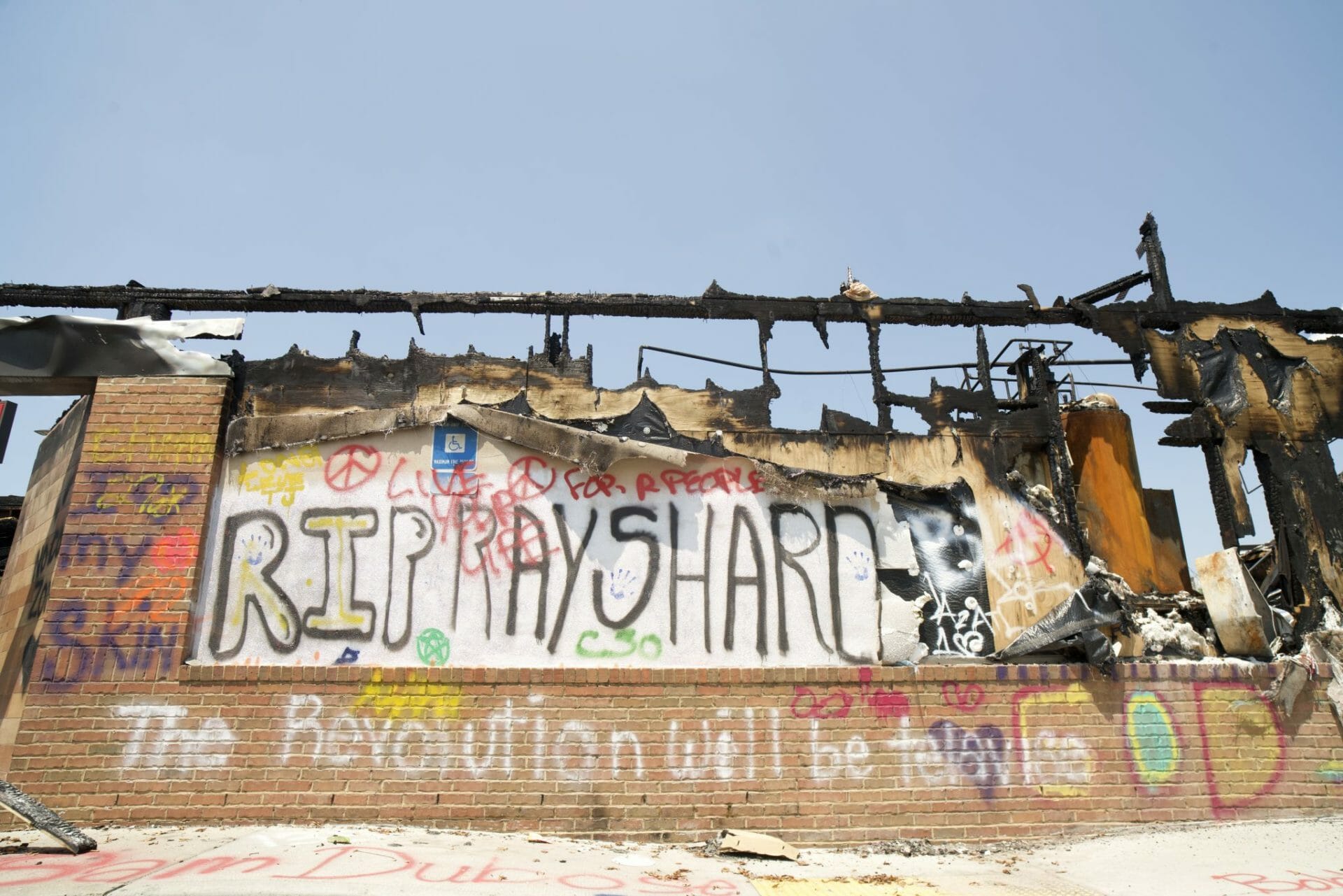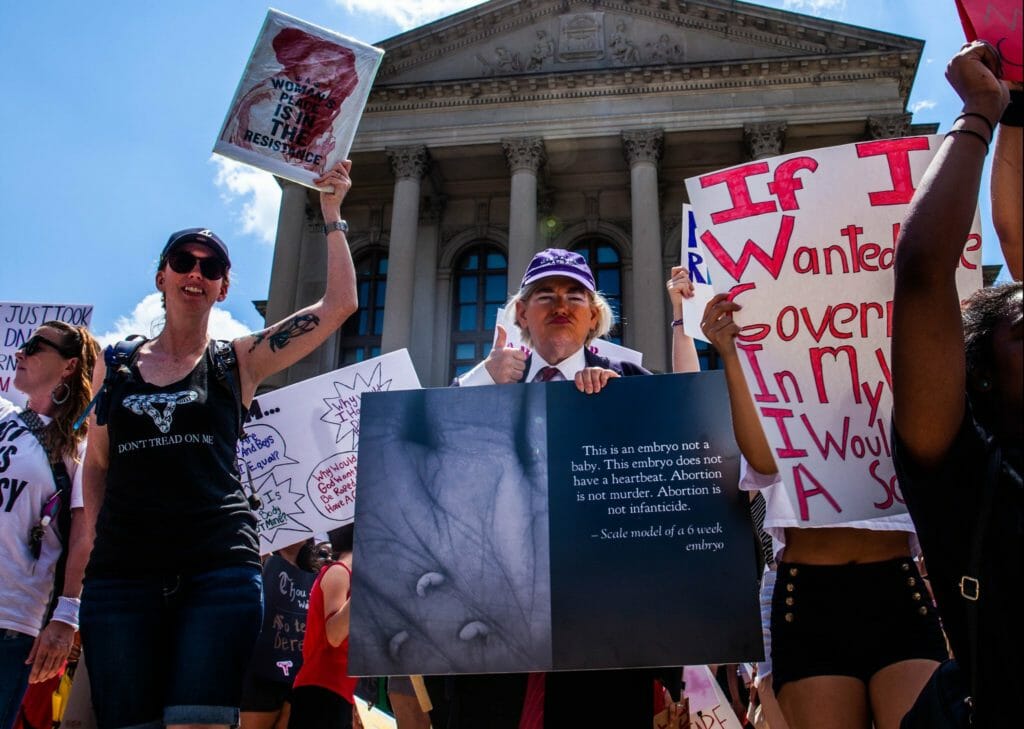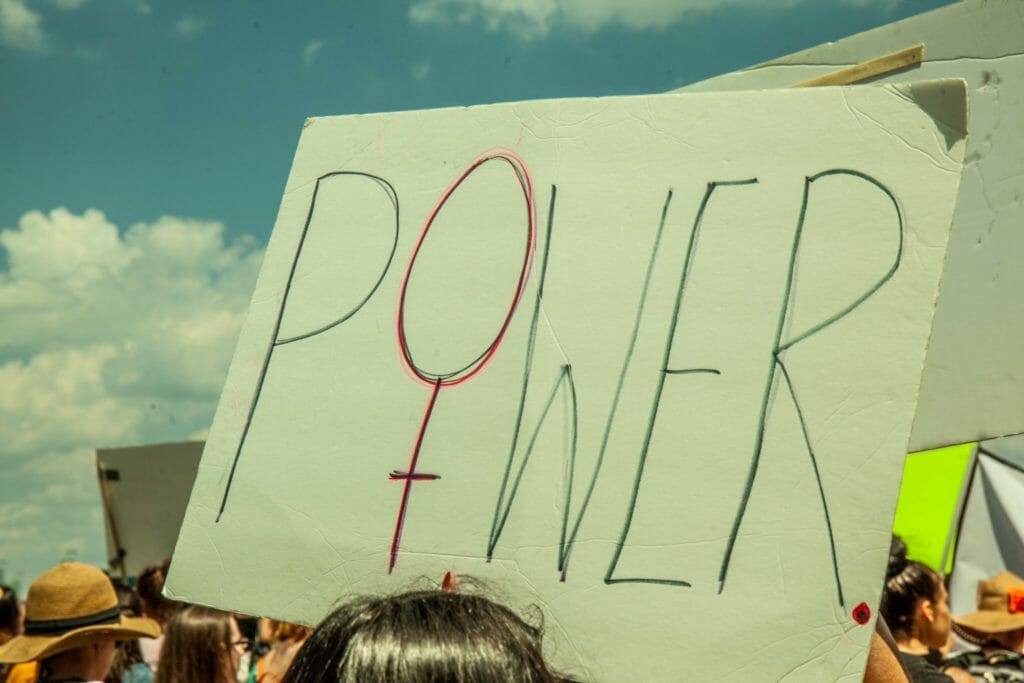Following Mayor Bottoms\’ veto of Atlanta City Council\’s 8 Can\’t Wait legislation and a contentious council meeting, council members vote to file the Rayshard Brooks bill that was geared towards reimagining public safety and act as if it never happened
This article was published on July 16, 2020.
ATLANTA — Atlanta City Council met virtually on Wed., July 15, at 1:30 p.m. for its Finance/Executive Committee meeting with an agenda that included a vote on the Rayshard Brooks Bill (Ordinance 20-O-1492). The bill, proposed by Councilmember Antonio Brown, District 3, sought to authorize the Chief Financial Officer to amend the FY2021 General Fund Budget to transfer $73,448,723 to a trust fund until Dec. 1, 2020. If passed, the Atlanta City Council would then work with the mayor’s administration to review recommendations for systemic changes and reimagine public safety and the funds would be returned back to the General Fund.
Originally, the bill (initially introduced by Councilmember Jennifer Ide as Resolution 20-R-4068) sought to withhold money from the Atlanta Police Department’s budget, which included a $14 million increase to the APD in Fiscal Year 2021. This fiscal year\’s budget increase in the APD budget accounts for pay raises and expanded contracts for body cams. Ide’s resolution proposed the city hold 50% of the APD’s budget in a trust fund, which would be returned by Dec. 1, 2020, after the council and mayor’s office formulated a concrete plan to reimagine public safety and police accountability. In the spirit of compromise, the bill was then amended by Brown to consider other areas from which funds could be withheld to fulfill the bill without affecting police salaries or pensions. On June 20, the resolution passed but the ordinance was narrowly voted down, failing to pass by one vote; this means the council voted on a resolution that the city should withhold police funds, but did not vote to give the city any power to do so.
According to an internal memo sent to city council members from the mayor’s office last night, “Initially, in preparing the ‘Ide’ legislation, the Department of Finance was asked to calculate half of the Atlanta Police Department (APD) personnel budget without affecting pension, and then add the amount not contractually obligated. This was the basis for the proposed $73,448,723 amount initially identified.”
We received a copy of the internal memo around 8:15 p.m. while City Council was still listening to public comment in regards to the Rayshard Brooks Bill. It was sent to committee members Jennifer Ide, Natalyn Archibong, Joyce Sheperd, Howard Shook, Andre Dickens, J.P. Matzigkeit, and Matt Westmoreland. We are unclear as to when council members received and read the email.
In short, the mayor’s administration officially requested a motion to file the legislation, which prompted changes in the bill in an attempt to save it from being voted down. As a member from the council’s legal department clarified in yesterday’s meeting, filing legislation in City Council would be to file it away and to “act like it never happened.” The other option would be to hold the legislation, which would have granted the Council more time to reconsider the legislation and have it re-presented.
For transparency, we’ve uploaded a document containing the mayor’s email in full here.
The day consisted of over five hours of public comment with a majority being from Atlanta residents calling to voice their support of the Rayshard Brooks Bill. Public comment also consisted of more than several calls from people who do not live in Atlanta and were expressing their opposition to the bill, stating they would refuse to return to Atlanta and support any businesses in the city. It is unclear as to whether or not council members actually considered these requests and threats from non-residents in their decisions later in the evening.
By the time public comment ended, City Council members were presented a new paper that was to substitute the Rayshard Brooks Bill the council, the public, and the media had come in the past few weeks. This substitute was drawn up by Brown in collaboration with Councilmember Ide and Deputy Council Staff Director Santana Kempson-Wright after learning council members intended to vote down the Rayshard Brooks Bill following the mayor’s request.
“I worked behind the scenes with Ide and Kempson-Wright,” Brown explained later in the meeting, “to figure out how we can reach a place of compromise for the community and for this body to be able to still move something forward so we don’t continue to incite the existing unrest that is happening just not in Councilmember Sheperd’s district, but in the entirety of this city. I did it as a measure to reach a place where we can all find common ground, where we can work together as a unified voice to move something forward.”
He also stated it was not brought to his attention that this action would at all endanger the bill or invite a motion to file it.
When presented with the substitute, Councilmembers Westmoreland and Dickens remarked how the substitution substantially differed from the original, with Dickens saying it was almost “75% different.” Westmoreland, saying that since it was a “different legislation than what we’ve been talking about,” asked if the council could consider it a walk-in and hold it so the council could review it.
He went on to say that if the council considered it a walk-in, they could amend the agenda and then vote on a motion to hold. If the bill were to be held, it would be reintroduced as new legislation during the next full council meeting on Aug. 3, following the council’s two-week recess.
There was then a bit of contention between council members Brown and Sheperd, along with Shook openly displaying his annoyance for being forced to sit in a council meeting until almost 10 p.m. after listening to hours of public comment. Last week, Councilmember Matzigkeit introduced a resolution to narrow the public comment line window to 4-7 p.m. the day before a council meeting, severely limiting the public’s opportunities to call to weigh in on the council’s decisions. That resolution will go into effect on Aug. 2.
Both Shook and Sheperd pushed to file the Rayshard Brooks Bill while Archibong and Ide spoke to the council’s need for more time to consider, especially factoring in Brown’s work on the legislation and his correspondence with activists and community organizers who have been mobilizing in Black Lives Matter protests. Referring to the recent drama between the mayor and City Council, Archibong stated, “There’s a lot of talk about us being disrespected by other entities; let’s not disrespect ourselves.”
In regards to the council’s motion to file, Brown said, “I’m going to be honest, I’m a little emotional right now, because I’ve gone above and beyond to try to reach a place of compromise with council members. I have tried to do everything in my power to address the unrest in the city while also addressing the controversial issues in the city when it comes to police brutality and issues around reimagining public safety. I think [filing the paper] was completely unnecessary, because you’re not filing a paper that I brought forward; you’re filing the voice of the people away. It was not necessary when we could’ve placed it on hold while we presented a new paper. So many times we like to point out amongst ourselves the issues and opinions we have for one another, but when it comes down to us giving deference or treating each other the way we want to be treated, when it’s not convenient for us, we don’t do that. I think today’s vote to file is a reflection of that. I think it was unnecessary and disrespectful. I personally can’t stand by that. This isn’t about me; this isn’t about your personal opinion about me. This is about listening to people who feel like they have not been heard in this city for decades. You didn’t have to file this paper.”
Sheperd then readdressed Brown, stating that this decision wasn’t personal while Shook repeatedly mentioned the fact that he’s been in council for 19 years, implying his tenure should supersede other factors and emotional appeal behind the motion to hold the legislation. Sheperd appeared to take issue with Brown, claiming he was speaking on behalf of residents in her district, which includes the south Atlanta neighborhood where Rayshard Brooks was killed, without properly representing the majority; she went so far to say that he only spoke to two or three community members. Meanwhile, Shook appeared baffled at the idea that council would insist on doing things differently in considering the new piece of legislation a walk-in and voting to hold it rather than filing it upon the mayor’s request.
Council members Sheperd and Shook’s sentiments towards public comment, the bill, and their fellow council member’s efforts pose greater issues in regards to the general attitude that seems so deeply embedded in much of Atlanta’s current leadership. And Atlanta is not unique here; if the country is waking up to anything, it’s that we haven’t been doing anything right, and cities across the country are being met with resistance from leadership to match these realizations. Case in point: the ever-apparent existential threat of police brutality against Black Americans and government’s lack of meaningful reform as well as the coronavirus pandemic and our government’s inability to prepare for it along with its utter failure to handle it.
For Sheperd, how could something considering the reinvestment into Black and brown communities in Atlanta not be personal, as the public have seen countless Black bodies brutalized and assaulted by the police as well the city and the state’s consistent disregard for Black communities’ wellbeing? As for Shook, perhaps this is a reflection of how outdated certain council members have become, making them far too rigid and beyond reprieve when it comes to implementing real change, frequently balking “this is always the way we’ve done things.”
Sheperd and Shook are not outnumbered in their attitudes in public service and the buck certainly doesn’t stop with them. Just last week in another council meeting, Councilmember Cleta Winslow, District 4, stated that “these people on the internet” expressing their support of defunding police and the Rayshard Brooks Bill’s effort to reimagine public safety are only a small portion of the voting pool. In this comment, Winslow insinuates their opinion simply isn’t worth considering while also looking down on the very medium that has become the public’s arena for information gathering, reporting, and movement building in the 21st century.
If “these people on the internet” and the ones taking the time to call the public line to the City Council repeatedly to express their support of the bill are not the people whose voices she wants to take into consideration, then who does Winslow think she’s serving and through what channels do they reach the council? And what about the “people on the internet” who are attempting to make moves to secede Buckhead from the rest of the city, or the ones who believe that defunding the police will lead to higher crime rates when research shows that more policing does nothing to reduce crime? What is Winslow or other city council members doing to inform the public and get them on the same page to help the city usher in a new era, rather than criticizing and talking down to younger generations that make up a great portion of the current social movement that has likely become the largest movement in U.S. history?
If members of City Council insist on treating “these people on the internet” like they’re some sort of minority not worth serving in 2020, then it’s time to rethink the leadership within the City Council and consider the fact that those who embody its majority are simply outdated. After the initial ordinance proposed to withhold funds from the APD was narrowly voted down on June 20, council members who voted against it later falsely claimed the legislation was illegal while echoing the need to support of the APD during a time when the police were responding to peaceful protesters against police brutality with more police brutality. Additionally, this vote and overwhelming support and lack of critical thought towards the city’s police department occurred after an APD officer shot and killed Brooks, who was unarmed and did not pose a threat to the officers, and after officers received a $500 bonus following massive walk-outs within the department. And as we know, Brooks was not the first Black man killed by the APD even in just recent history. (Say their names: Oscar Cain and Jimmy Atchison.)
We can’t think of any other job or industry where employees are granted a bonus after massive walk-outs or receive a pay raise during a global pandemic. Across the board, essential workers have suffered layoffs, furloughs, and pay cuts, even within our nation’s health care systems. How much more does the APD need in terms of support from the city council and the mayor’s office, and what is it going to take in order to shift this support to Black and brown communities?

The motion to file the Rayshard Brooks Bill was voted through with a 5-2 vote last night, with Ide and Archibong being the contenders voting to hold the bill. Both Dickens and Westmoreland voted to file the bill, which arrived as a bit of a shock, considering their previous alignment with the bill along with the 8 Can’t Wait legislation that was unanimously passed in council on Mon., July 6. Mayor Bottoms vetoed the legislation yesterday and we are still awaiting Bottoms’ official statement to explain the veto, for which she has 48 hours to provide after her decision. (Editor\’s note: it is not our general sentiment at this publication that the mayor vetoed the legislation with hopes to install more meaningful reform or as a criticism of 8 Can\’t Wait itself; we feel it was a political maneuver and an effort to maintain the status quo, as reflected in the mayor\’s other actions during her administration which is beyond the scope of this article.)
In her response to Brown on Twitter, Mayor Bottoms cited that there were legality issues with the 8 Can’t Wait legislation; however, we later learned from a source within City Council that her legal department actually approved the legislation. This isn’t a new pattern, as we previously noted council members stating the initial Resolution 20-R-4068 was illegal, even though the City of Atlanta Department of Law said otherwise.
After the vote was complete, Brown took another few moments to address his emotional response and further explain the work behind the legislation.
“My emotions had everything to do with the fact that this body voted to file away the voices of the people [who] called in with over 40 hours of public comment asking you to support and pass the Rayshard Brooks Bill to address the unrest in this city when we look at reimagining public safety,” he said. “Knowing that you all were against it, even after the 40-plus hours of public comment, social media, and publicity campaigns, knowing that you were still not listening to the people, knowing that you were still not taking into consideration what people were begging and pleading you to do … I said, ‘You know what? Let me reach a place of compromise and let’s try to make this work so that everybody can stand behind this.’ I made this substitute, hoping we could bring it before this body and that we could hold it, move it forward, figure it out. Out of respect for [the Brooks] family, the citizens, the residents, the community, the organizers, the protesters that have been rallying for days in this city, I simply asked if we could hold the paper while we adjusted to reach a place of compromise with the community. Personally, I didn’t think that was a lot to ask. This is a life that we lost in the city of Atlanta; a paper that the people asked for. It was me trying to help, trying to reach a place of compromise. So yes, I’m very emotional when we’re talking about the voice of the people that you’re filing away.”
Long story short, a request from the mayor sent to City Council at nearly the last minute dismantled and tanked the Rayshard Brooks Bill while city council members chose to not give it any further time and attention; moreover, they shunned a council member’s continuous and substantial efforts with community organizers and shut the door on future compromises. Brooks, as it stands today, died in vain when it comes to legislative change in our communities and city leadership. City council members who voted to file and effectively kill the Rayshard Brooks Bill factored in everything outside of what the public actually wants, as it was overwhelmingly expressed in over 40 hours of public comment over the course of several council meetings.
Yesterday’s events, between Mayor Bottoms vetoing 8 Can’t Wait legislation and the City Council’s refusal to keep the Rayshard Brooks Bill alive, invariably reveal one major truth: Atlanta’s current city leaders are unfit to usher in the change that is required to even begin to rectify the damage done by our police systems and bureaucratic violence against Black and brown people. If our leaders fail to even consider the most compromised forms of reform and appear to be deadlocked in outdated, rigid ways of thinking, then why expend continuous amounts of energy in pushing such compromises when that energy could be better spent focusing on what communities really need? There is a chance that deviating too far from the movement’s demands will only result in further harm and post up even more barriers to truly transformative, systemic change, as it’s been explained in criticisms of 8 Can’t Wait legislation and as we witnessed in the last 24 hours.
Perhaps the root of our issues don’t only lie in the police department, but in Mayor Bottoms herself and city council, as well. We consider yesterday a case of trial and error in terms of compromising when it comes to reforms addressing police brutality and issues within our systems. Atlanta learned the hard way that the majority of its leaders aren’t willing to compromise with the community even as they simultaneously insist protesters and community organizers behave like a sanitized version of Martin Luther King, Jr., and try to work in such compromising efforts. As such, yesterday turned the final screw in what were extremely watered-down, compromised efforts towards reform.




